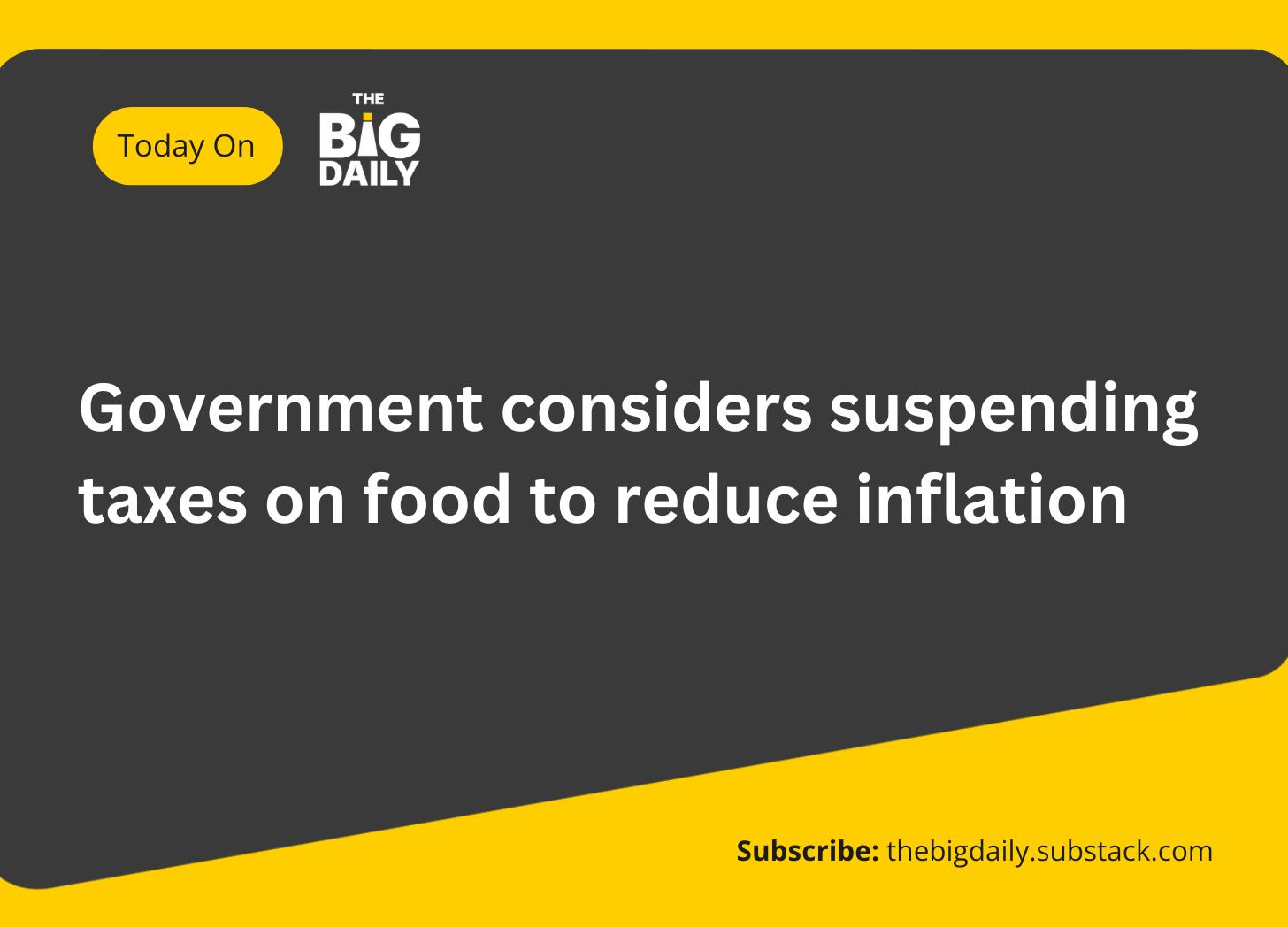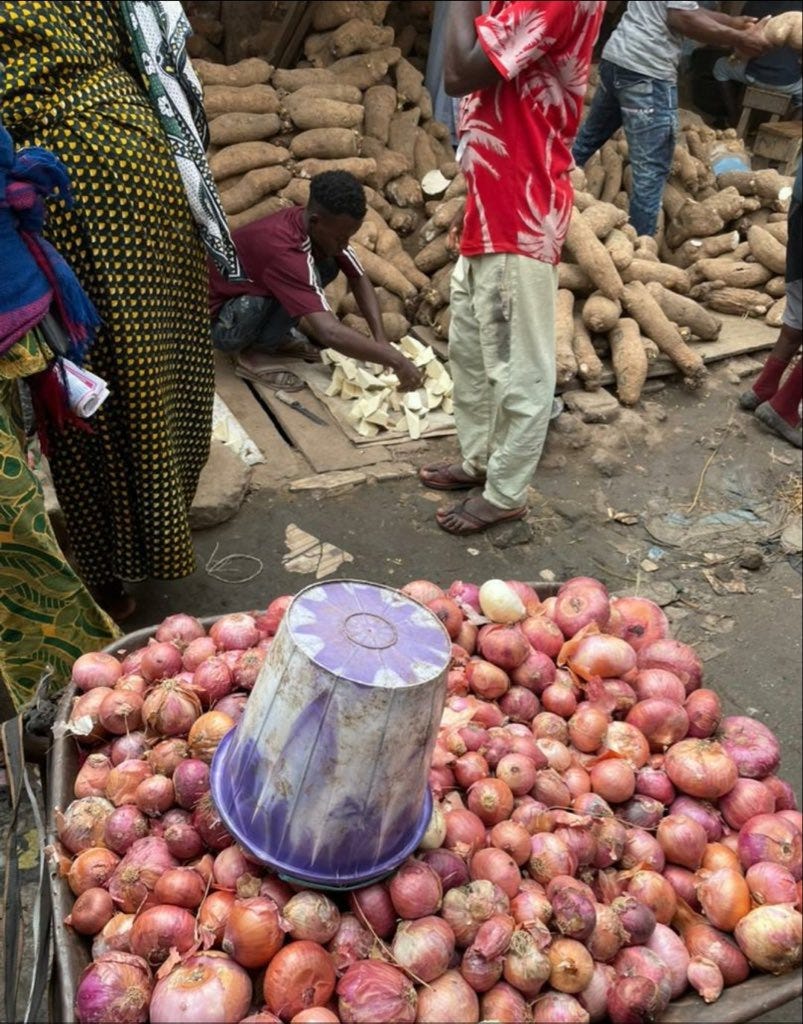Happy Friday, Big Brains. I hope you have exciting weekend plans because you absolutely deserve it. I left you some recommendations at the end of the newsletter if you’re not sure what to do yet. You’re welcome!
- Margaret
Word count: ~1200
Reading time ~5 mins
Let’s get into today’s edition:
Government considers suspending taxes on food to reduce inflation
US lawmakers petition Biden, demand release of detained Binance executive
UN identifies Nigeria and 17 other countries as “hunger hotspots”, predicts severe food insecurity
The Big Deal
Government considers suspending taxes on food to reduce inflation
To every Nigerian who was born to be a foodie but has been forced to practise intermittent fasting, there’s a chance that things are about to get better. The Tinubu-led administration is considering temporarily removing taxes charged on imported food and drugs for six months to reduce the country’s inflation and cost of living.
Nigeria’s headline inflation rate reached 33.69% in April, the highest since 1996. Since the president completed his first year in office on May 29, he has been under more pressure to address the people’s concerns, especially the rising cost of food.
According to a document seen by Bloomberg, the government may also temporarily remove taxes on fertilisers, poultry feed, flour and grains. This document has not been signed by the president but Bloomberg added that the project which is called Inflation Reduction and Price Stability Order will require the Ministry of Finance and the Central Bank of Nigeria (CBN) to come up with a plan to provide low-interest loans to the agriculture, pharmaceutical and manufacturing sectors to contribute to their goal of reducing the cost of living.
The president is also likely to suspend value-added tax (VAT) on diesel, some basic food items, and semi-processed foods like noodles and pasta.
The plan also includes suspending VAT on raw materials used to make food items, electricity, public transportation, agricultural inputs and produce, and pharmaceutical products for the rest of the year.
Why is this a big deal?
If President Tinubu signs this order, food could get cheaper and more accessible to the average Nigerian. But if it is anything similar to some of the president’s past actions to reduce food inflation in the country, it may not yield much result.
In July 2023, Nigeria declared a state of emergency to improve food security. That same month, the government announced it had raised $500 million to increase food production. Shortly after, President Tinubu unveiled a 500 billion-naira ($335 million) package to boost food supply, reduce transportation costs, and enhance manufacturing.
Despite these efforts, the situation has worsened. Some Nigerians are now buying yam slices because they can't afford whole tubers. But if the government stays transparent this time, the proposed measures could help lower the rising cost of food.
UN identifies Nigeria and 17 other countries as “hunger hotspots”, predicts severe food insecurity
Speaking of food insecurity, the United Nations has predicted that the worst is yet to come in a new report.
The report issued by the Food and Agriculture Organisation of the United Nations (FAO) and the United Nations World Food Programme (WFP) was released to call for urgent action to save lives and prevent famine in 18 countries, including Nigeria, where hunger is expected to increase from June to October 2024.
Cindy McCain, the WFP Executive Director said, “Once a famine is declared, it is too late—many people will have already starved to death. In Somalia in 2011, half a quarter of a million people who died of hunger perished before famine was officially declared. The world failed to heed the warnings at the time and the repercussions were catastrophic. We must learn the lesson and act now to stop these hotspots from igniting a firestorm of hunger.”
Other African countries like Malawi, Mozambique, Zambia and Zimbabwe are also on the list of hunger hotspots.
Nigeria isn’t a stranger to famines…
Food crisis in Nigeria has been a problem that has remained unsolved for years. In the northeast alone, 4.1 million face crisis-level food insecurity. We've also experienced some devastating famines in the country, with the most notable being during the Biafra war. At its peak, around 10,000 people, including 6,000 children, died of starvation everyday. Over the course of three years, about 2 million people lost their lives.
The prediction from the UN isn't hard to believe, considering how expensive food has been since the beginning of the year and the inability of the government to make the situation better.
US lawmakers petition Biden, demand release of detained Binance executive
The Binance VS Nigerian government drama has been continuous since it started in February, the producers of Bridgerton could learn a thing or two from the consistency. Sixteen members of the United States House of Representatives are asking President Joe Biden to help bring back Binance executive Tigran Gambaryan, who was arrested in Nigeria on February 26 along with his colleague Nadeem Anjarwalla, who was reported by Aljazeera to have escaped from custody on March 25.
Gambaryan and Binance were accused of not paying value-added tax and corporate income tax. They were also charged with helping customers avoid paying taxes using their platform.
The lawmakers are insisting that Gambaryan is a “U.S. citizen wrongfully detained by a foreign government” and his detention has been “marked by excessive and harsh treatment.” They also added that they are scared for his life and mental health after Gambaryan slumped at his last court hearing.
Is he really wrongfully detained?
The law firm representing Gambaryan informed the Nigerian Federal High Court that he was "very ill" and needed immediate and thorough medical care. His family also said that he might have malaria and a severe throat infection.
The Nigerian Constitution under its human rights provisions clearly permits the right to life and dignity for all humans. Even though the constitution does not specifically say anything about the detention of sick individuals, these rights imply that detainees should be treated humanely and have access to necessary medical care.
But the Nigerian prison regulations and the Nigeria Correctional Service Act provide more specific laws. For instance, if a detainee is seriously ill and the facility where they are being held lacks what it takes to treat them, the law allows for their transfer to a suitable medical facility. This is typically based on the certification of a medical officer and can be authorised by the Comptroller-General or the prison superintendent in an emergency to prevent unnecessary suffering or deterioration of their health.
Justice Emeka Nwite ordered Gambaryan's transfer to a hospital, but a spokeswoman for his family said he was only permitted a brief hospital visit and his health is deteriorating rapidly due to poor treatment.
The Big Picks
We were girls once: When you’re done binge-reading The Big Daily, your next read should be Aiwanose Odafen’s newest book. Famously known for her book Tomorrow I Become A Woman. Aiwanose’s characters Ego, Zina and Eriife were always destined to be best friends, ever since their grandmothers sat next to each other on a dusty bus to Lagos in the late 1940s, forging a bond that would last generations.
Bridgerton: While Miss Shonda Rhimes has decided to make the real lovers wait till June 13 for the second part of the last season, you can still watch or rewatch the first part. Gossip and romance is the perfect recipe for a great weekend.
If you enjoyed this edition of the newsletter, don’t forget to subscribe and share. You can also leave feedback for us in the comments or by filling out this form.









Nigeria ehn
God Abeg! 😭😭